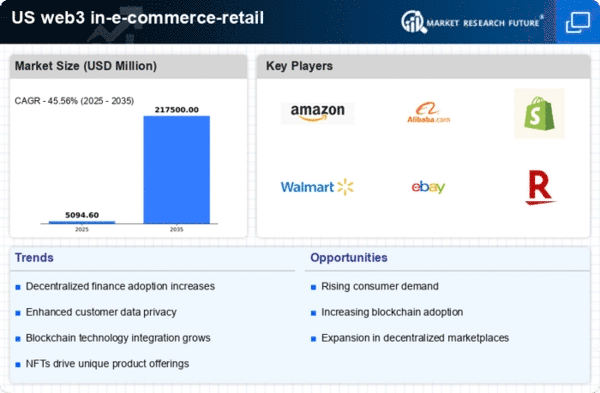Tokenization of Assets
Tokenization is emerging as a transformative force within the web3 in-e-commerce-retail market, enabling the representation of physical and digital assets as tokens on a blockchain. This process allows for fractional ownership, making high-value items more accessible to a broader audience. For instance, luxury goods and collectibles can be tokenized, allowing consumers to invest in shares of these assets. The market for tokenized assets is projected to grow significantly, with estimates suggesting it could reach $4 trillion by 2025. This trend not only democratizes access to premium products but also enhances liquidity in the retail sector. As more retailers explore tokenization, it is likely to reshape consumer engagement and investment strategies in the web3 in-e-commerce-retail market.
Enhanced Consumer Privacy
The web3 in-e-commerce-retail market is witnessing a growing emphasis on consumer privacy, driven by the decentralized nature of blockchain technology. This shift allows consumers to have greater control over their personal data, which is becoming increasingly important in a digital economy. According to recent data, approximately 70% of consumers express concerns about data privacy when shopping online. As a result, retailers adopting web3 solutions are likely to see increased customer trust and loyalty. Enhanced privacy measures not only protect consumer information but also align with regulatory requirements, potentially reducing compliance risks. This focus on privacy is expected to be a key driver in the web3 in-e-commerce-retail market, as businesses strive to create secure shopping environments that respect consumer rights.
Decentralized Marketplaces
Decentralized marketplaces are gaining traction within the web3 in-e-commerce-retail market, offering an alternative to traditional centralized platforms. These marketplaces empower consumers and sellers by eliminating intermediaries, thereby reducing fees and enhancing profit margins for retailers. The rise of decentralized finance (DeFi) is also contributing to this trend, as it provides innovative financial solutions that can be integrated into these marketplaces. Data suggests that decentralized marketplaces could capture a market share of 15% by 2026, driven by consumer demand for more equitable trading environments. This shift may lead to a more diverse range of products and services available to consumers, ultimately transforming the retail landscape.
Smart Contracts for Automation
The integration of smart contracts is revolutionizing operational efficiency in the web3 in-e-commerce-retail market. These self-executing contracts facilitate automated transactions and enforce agreements without the need for intermediaries. This automation can lead to reduced transaction costs and faster processing times, which are critical in a competitive retail landscape. Recent studies indicate that businesses utilizing smart contracts can reduce operational costs by up to 30%. Furthermore, the transparency and security provided by blockchain technology enhance trust between consumers and retailers. As more businesses adopt smart contracts, the web3 in-e-commerce-retail market is likely to experience increased efficiency and improved customer satisfaction.
Sustainability and Ethical Consumption
Sustainability is becoming a pivotal concern in the web3 in-e-commerce-retail market, as consumers increasingly prioritize ethical consumption. The transparency offered by blockchain technology allows consumers to trace the origins of products, ensuring they align with their values. Reports indicate that 66% of consumers are willing to pay more for sustainable brands, highlighting the potential for retailers to capitalize on this trend. By adopting web3 solutions, businesses can showcase their commitment to sustainability, potentially attracting a loyal customer base. This focus on ethical consumption is likely to drive innovation and reshape product offerings in the web3 in-e-commerce-retail market, as companies strive to meet the evolving expectations of environmentally conscious consumers.
















